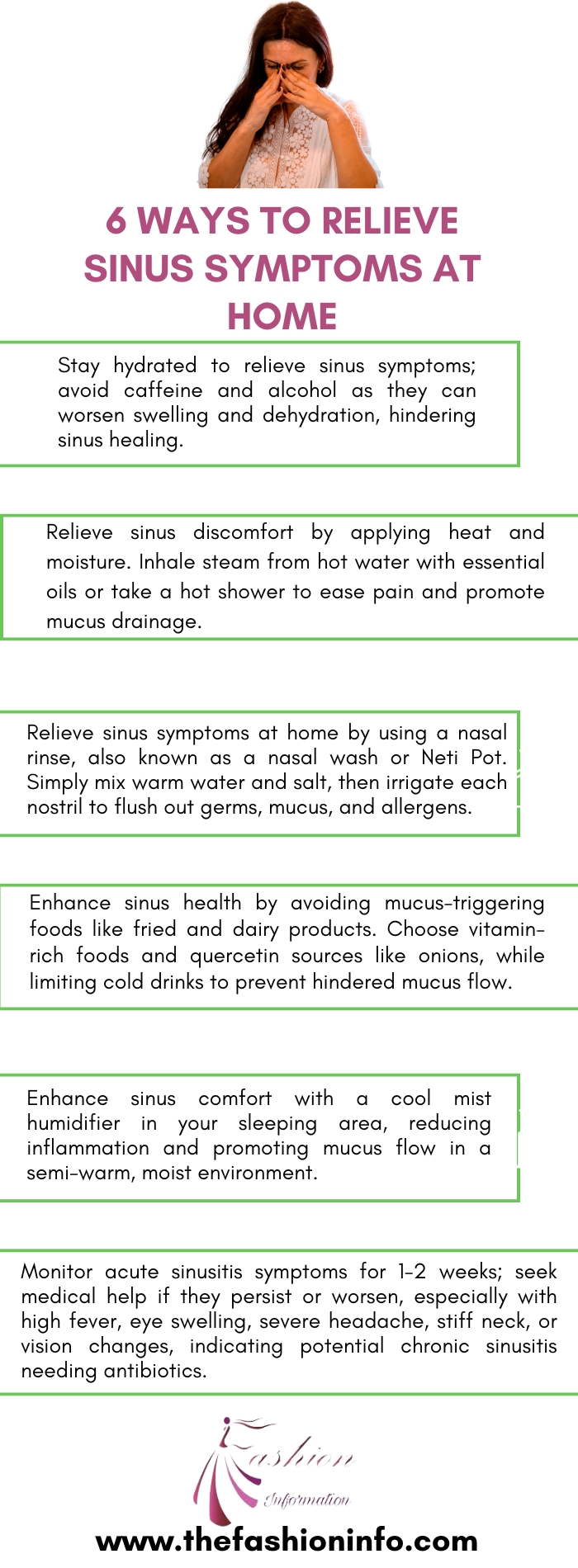Table of Contents
Introduction
Sinuses are the air-filled cavities located on the sides of your nose. When allergies, viral, or bacterial infections occur, these cavities may become clogged or infected and result in a condition known as sinusitis or rhinosinusitis. According to the Center for Disease Control and Prevention (CDC), approximately 28 million people in the United States suffer from sinusitis each year. The question is how to Relieve Sinus Symptoms at Home? Let’s take a peek.
Sinus symptoms may include:
- Pain and pressure in your face, eyes, cheeks, nose, and forehead
- Thick mucus
- Stuffy nose
- Headache
- Fatigue
- Cough
Fortunately, various home remedies can relieve these symptoms while your body fights off infection and allergies. While effective, these home remedies may not completely eradicate sinusitis overnight. Regular application of these remedies for a few days, however, can significantly improve symptoms.
Increase Fluid Intake – Relieve Sinus Symptoms at Home
As with most illnesses, proper hydration helps the body heal faster. Adequate hydration helps keeps your sinuses moist and thin out the mucus in the sinus membranes. Beverages containing caffeine or alcohol can dehydrate the sinuses and increase swelling in the membranes, making it harder for your sinuses to heal and fight off infection.
Relax the Sinus Cavities With Heat and Moisture.
One of the most effective home remedies for a sinus infection involves warming and heating your sinus membranes to help ease pain and help mucus drain.
You can do this with various techniques. One method is to drape a towel over your head and then breathe in the steam from a container of hot water. Be careful not to get too close to the hot water, and keep your eyes closed while inhaling. For added effectiveness, you can add a few drops of essential oils, such as peppermint, eucalyptus, lavender, chamomile for a calming effect.
Alternatively, you can also take a hot shower and slowly breathe in the hot, moist air. Another effective method is to place a warm cloth over your nose for a few minutes. This remedy helps moisten the sinus membranes and relieve facial pain associated with sinus infections.
Use a Nasal Rinse to Flush the Sinuses – Relieve Sinus Symptoms at Home
This remedy is also known as a nasal wash, nasal lavage, or nasal douche. Some people refer to this remedy as the Neti Pot, a popular device used to wash the sinuses. The basic procedure involves using a saline solution to flush germs, mucus, and allergens from the sinus passages.
To use a nasal wash, first, add warm water and salt into a squeeze bottle. Next, place drops of the solution into one nostril. As you insert the drops into one nostril, tilt your head back so that the solution drains out of the other nostril. Repeat this process in the other nostril.
Prepared rinses are available for purchase at many retailers. If you prefer to make your rinse, experts advise that you use distilled or sterile water to avoid the possibility of inserting pathogens into your sinuses. You can sterilize tap water by boiling it for a few minutes and then allowing it to cool for a few minutes before using it. After completing the nasal wash, rinse the bottle with clean, sterile water and then allow it to air-dry.
Make Some Changes to Your Diet.
Certain foods, such as fried and starchy foods, sweets, dairy, and meats, can worsen the sinus infection because they can trigger excess mucus production. A healthy diet with foods rich in vitamins A, C, and D helps your immune system build a strong defense against sinus infections. In addition, common kitchen spices such as cayenne pepper have anti-inflammatory and antibacterial properties that can help break up and drain out mucus.
Foods that are rich in quercetin can also help fight sinus infections. Quercetin is a natural antioxidant found in plants such as onions. It can serve as a very effective anti-inflammatory component to help inhibit the cells that produce and release histamines, which are chemicals that stimulate mucus secretion.
In addition to healthier foods, it is also a good idea to reduce the intake of cold drinks. While cold beverages may initially seem like a good idea to cool the throat, cold liquids can prevent the movement of cilia in the nose. Stalled cilia make it more difficult for the mucus in the nasal passages to flow.
Use a Humidifier.
Your sinuses function best in a semi-warm, moist environment. Air that is too hot and dry can aggravate the sinus passageways by causing additional inflammation and swelling. A humidifier works by dispensing water vapor or steam into the air. When you inhale the air, the moisture helps decrease irritation and inflammation of the sinuses, making it easier to loosen up mucus in nasal passages.
Humidifiers are available at various price points for many budgets. There are also different sizes of humidifiers ranging from travel-size to large. The best setting for a humidifier is a somewhat cool mist that makes the air moist but not too damp. For best results, place the humidifier in the room where you sleep.
Getting More Help For Your Sinuses
Most people with acute sinusitis don’t need immediate medical attention. If your symptoms show no improvement after one to two weeks, consult with your physician, especially if you are experiencing any of these symptoms:
- High fever
- Eye swelling
- Inflamed skin
- Severe headache
- Stiff Neck
- Changes in vision
These symptoms can indicate a more severe condition, such as chronic sinusitis. In the event of a chronic sinus infection, your doctor may suggest additional treatment options, such as antibiotics.
Infographic: 6 Ways to Relieve Sinus Symptoms at Home


